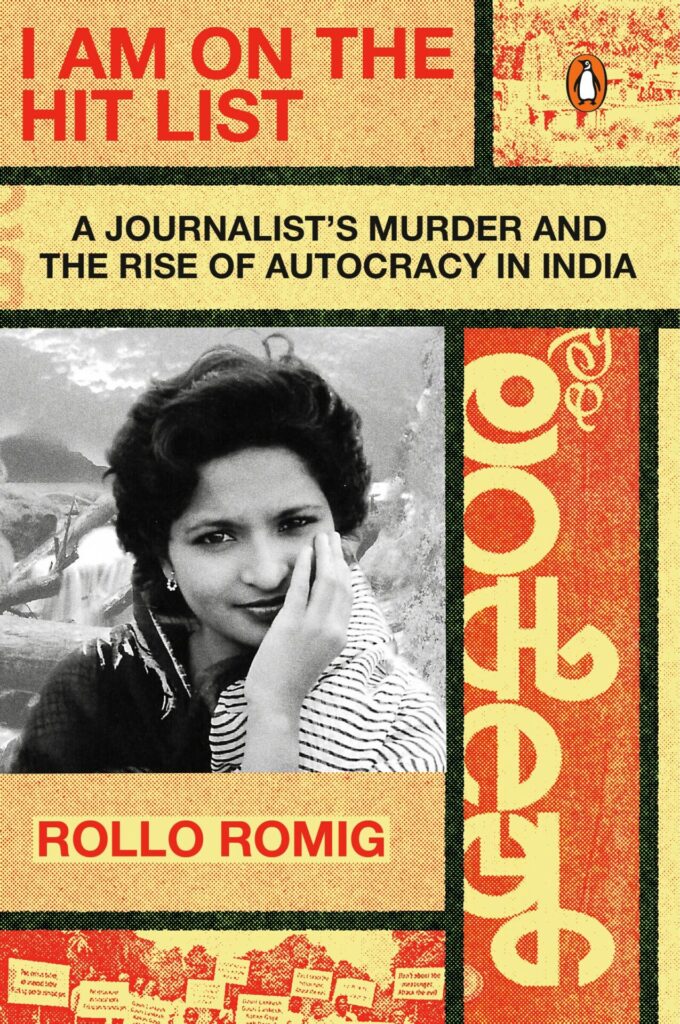
The Fight for Justice and Freedom: A Deep Dive into Rollo Romig’s I Am on the Hit List
In I Am on the Hit List: A Journalist’s Murder and the Rise of Autocracy in India, Rollo Romig delivers a gripping exploration of the life and tragic death of Gauri Lankesh, a courageous journalist who became a target for her outspoken criticism of rising authoritarianism in India. This powerful narrative not only recounts Lankesh’s story but also examines the broader implications of her murder in the context of the ongoing struggle for democracy and freedom of the press in a country grappling with increasing censorship and violence against dissenters.
Summary
The book opens with the shocking murder of Gauri Lankesh on September 5, 2017, outside her home in Bangalore. Known for her fearless journalism and activism, Lankesh was a prominent critic of right-wing extremism and a vocal advocate for marginalized communities. Romig sets the stage by detailing Lankesh’s background, her work as the editor of Lankesh Patrike, a Kannada-language weekly, and her commitment to social justice issues.
As the narrative unfolds, Romig delves into the political climate in India, highlighting the rise of Hindu nationalism and the increasing intolerance for dissenting voices. He provides a historical context for Lankesh’s activism, tracing the roots of the current political landscape and the threats faced by journalists and activists who dare to challenge the status quo.
Romig intersperses Lankesh’s story with interviews and insights from fellow journalists, activists, and family members, painting a vivid picture of her life, her struggles, and the impact of her work. He captures the essence of Lankesh’s character—her humor, her passion, and her unwavering commitment to truth and justice.
The investigation into Lankesh’s murder serves as a central plot point, revealing the complexities of the case and the challenges faced by law enforcement in bringing her killers to justice. Romig explores the implications of her death on the journalism community in India, as well as the chilling effect it has on free speech and democratic values.
Throughout the memoir, Romig emphasizes the importance of remembering Lankesh’s legacy and the need for continued resistance against authoritarianism. He highlights the role of journalists as watchdogs of democracy and the vital importance of protecting their rights to report freely and without fear of retribution.
Main Characters
- Gauri Lankesh: The protagonist of the memoir, a fearless journalist and activist whose murder serves as the catalyst for the narrative. Lankesh’s commitment to social justice and her criticism of authoritarianism define her legacy.
- Rollo Romig: The author and narrator, who provides insight into Lankesh’s life and the broader political context in which she operated. His reflections on the implications of her murder add depth to the narrative.
- Fellow Journalists and Activists: Various individuals who share their experiences and perspectives on Lankesh’s work and the challenges faced by journalists in India. Their voices contribute to the overall understanding of the political climate.
- Law Enforcement Officials: Individuals involved in the investigation of Lankesh’s murder, whose efforts to bring her killers to justice highlight the complexities of the case.
Key Events and Plots
- The Life of Gauri Lankesh: The memoir begins with an exploration of Lankesh’s early life, her education, and her journey into journalism, setting the stage for her activism.
- The Rise of Authoritarianism in India: Romig provides a historical overview of the political climate in India, detailing the rise of Hindu nationalism and the increasing intolerance for dissent.
- The Murder of Gauri Lankesh: The shocking event that serves as the catalyst for the narrative, prompting an investigation and a national outcry for justice.
- The Investigation: The book follows the investigation into Lankesh’s murder, revealing the challenges faced by law enforcement and the complexities of the case.
- The Impact on Journalism: Romig examines the chilling effect of Lankesh’s murder on the journalism community in India, highlighting the risks faced by those who dare to speak out.
- Lankesh’s Legacy: The memoir concludes with a reflection on Lankesh’s impact and the ongoing struggle for democracy and freedom of the press in India.
Suspense and Themes
I Am on the Hit List builds suspense through its exploration of the investigation into Lankesh’s murder and the broader implications of her death. Romig’s narrative creates a sense of urgency as he highlights the stakes involved in the fight for justice and the protection of free speech.
Themes of courage, resilience, and the importance of safeguarding democracy are central to the memoir. Romig emphasizes the role of journalists as defenders of truth and the need for society to protect their rights to report freely. The book also explores the complexities of power and the dangers posed by authoritarian regimes, serving as a cautionary tale about the fragility of democracy.
Conclusion
I Am on the Hit List: A Journalist’s Murder and the Rise of Autocracy in India is a powerful and thought-provoking memoir that sheds light on the life and legacy of Gauri Lankesh. Rollo Romig’s meticulous research and engaging storytelling provide readers with a nuanced understanding of the challenges faced by journalists in India and the broader implications of Lankesh’s murder for democracy and freedom of expression.
Through Lankesh’s story, Romig underscores the importance of standing up against authoritarianism and the need for continued resistance in the face of oppression. The memoir serves as both a tribute to Lankesh’s bravery and a call to action for readers to engage in the fight for justice and the protection of democratic values.
As the book concludes, readers are left with a sense of urgency and a renewed commitment to uphold the principles of free speech and social justice. I Am on the Hit List is a must-read for anyone interested in the intersection of journalism, politics, and the ongoing struggle for democracy in an increasingly authoritarian world. Romig’s narrative is a testament to the power of the written word to inspire change and honor the memory of those who have fought for truth and justice.
Read Full Novel
Read Related Novels
- “On a Move: Philadelphia’s Notorious Bombing” by Mike Africa. Jr. Summary
- Read Shameless by Brian Tyler Cohen eBook Review
- Read The Devil at His Elbow by Valerie Bauerlein eBook Review
- Read The Art of Power by Nancy Pelosi eBook Review
- Read That Liberian by Amanda Jones eBook Review
- Read Earth to Moon: A Memoir by Moon Unit Zappa Summary
- Read Rethinking Rescue by Carol Mithers Summary


